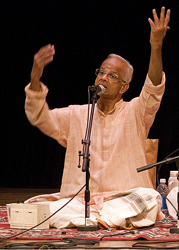
Thursday 09th Feb. 2012 0700 PM *Jugalbandhi
Veena: Vidushi Saraswati Rajagopalan & sitar: Ustad Saeed Zafar Khan
0800 PM Grand Flute recital by Vidwan Padmashri Dr. N. Ramani & Party
Friday 10th Feb.2012, 0700 PM Vocal concert by Smt. Kirnavali Vidyashankar:
0800 PM Grand Carnatic vocal recital by Vidwan Padmabhushan TV Sankaranarayanan & Party
Saeed Zafar Khan – Sitar a chip of the old block – was born in a home where his cradle was literally surrounded by stalwarts of the Delhi Gharana like Ustad Chand Khan, Ustad Usman Khan Usdad Bundu Khan – only to name a few. His renderings exude this vintage flavour blended with his own individualistic style. Khan Sahib is a senior graded artist from the All India Radio, and also in the panel of the Indian Council for Cultural Relations.
Veena player Saraswati Rajagopalan has been acclaimed as one of the leading Veena artists of Carnatic music today. Hailing from a music loving family, she started rendering solo performances from the age of 12. Initial training was from Smt. Radhamani Sharma of Karaikudi Sambasiva Iyer School and was later trained by Sangeeta Kalanidhi Shri. KS Narayanaswami and Shri TS Raghavani. She is a senior graded artist from the All India Radio, and also in the panel of the Indian Council for Cultural Relations.

The proud student of the flute maestro TR Mahalingam has been an international feature of fame and credit. The laurels and awards received by him are innumerable but he is loved by one and all for his sweetness and humility as a Human. He has plentiful number of successful students to his credit.
Kiranavali Vidyashankar comes from a lineage of well-respected Carnatic musicians that includes her legendary grandfather, Gotuvadyam Narayana Iyengar and father Chitraveena maestro Narasimhan. She has been in the eye of the public as a vocalist since the age of five, initially in tandem with her brother KN Sashikiran and later as a soloist.
She has presented chitraveena solo concerts and also teamed up with Ravikiran in duets. She is the first artist to be graded in both vocal and chitraveena by the national radio and television networks of India. Kirnavali has many students in India and the USA.

Sunaad and the music lovers of Delhi are privileged to have him to do the honors for the Madurai Mani Centenary celebrations.
Glossary:
* Sangammam – Sangamam means ‘coming together of people/ideas/things’; it is flowing together of two or more rivers and it also means ‘junction’. Here the blend of two different genres of music – the Carnatic and the Hindustani as seen in the Sitar (Hindustani) and Veena (Carnatic)
* Jugal bandhi. The term Jugalbandi is popularly used in Indian Classical Music to mean a fusion or a beautiful mix. During a jugalbandhi performance, it is generally seen that musicians of the two prime genres the Hindustani and the Carnatic take up common ragas and exquisitely bring out the beauty in the similarity and also show case the distinct identities.
* rasika – A lover of music, one who enjoys the music
* bhani – style
Author: Dr. Saroja Raman
Dr. Saroja Raman is a vocalist who has been pursuing Carnatic music from the age of 7. She has a Doctorate PhD in Music from the Delhi University, India


